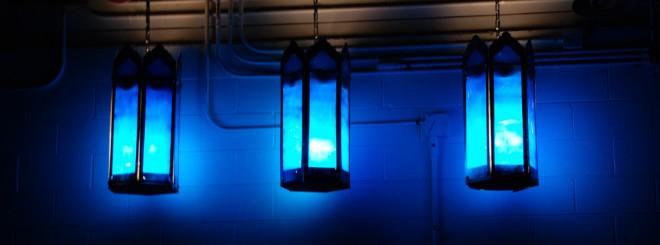
Better to stay away from your electronic gadgets after dawn, according to a new study, exposure to blue light emitted by electronics and energy saving bulbs can increase the risk of putting on unnecessary weight.
In a study reported in the journal Sleep, exposure to blue light either before or after the evening meal increased hunger and altered metabolism. Researchers found that the effects that started 15 minutes after the onset of light continued to persist even two hours after taking dinner. Additionally, blue light exposure also interfered with quality of sleep and increased insulin resistance.
Ivy Cheung and colleagues from the Northwestern University in the US analysed effects of dim and blue lights on 10 healthy individuals with regular eating and sleeping habits. During the four-day study, the participants took carbohydrate-rich isocaloric meals and were exposed to both dim light and blue light. Dim light experiment involved exposing the individuals to less than 20 lux during the 16 hours awake and less than 3 lux during the eight hours sleeping schedule at night. Later the participants, about 10.5 hours after waking up, were exposed to three hours of 260 lux blue light.
Results showed that blue light exposure increased appetite and sleep problems.
"It was very interesting to observe that a single three-hour exposure to blue-enriched light in the evening acutely impacted hunger and glucose metabolism," study co-author Cheung, a doctoral candidate in the Interdepartmental Neuroscience program at Northwestern University in Chicago, Illinois, said in a news release. "These results are important because they suggest that manipulating environmental light exposure for humans may represent a novel approach of influencing food intake patterns and metabolism."
Similarly, several studies in the past have shown that exposure to light at night increased the risk of many deadly diseases including cancer, diabetes, and heart disease.
Blue light can cause both harm and good results, but it depends up on the timing of the exposure, according to researchers from the Harvard Medical School. Exposure to blue wavelengths in daylight hours can help improve attention, mood and reaction times. On the other hand, the blue lights emitted by modern gadgets including computer and mobile phones can prove to be highly harmful at night.
Previous studies have found people who work at night shifts are at greater risk of many deadly diseases including breast and prostate cancers. Evidence shows that exposure to light at night inhibits release of melatonin, a hormone that possess anti-oxidant and anti-cancer properties and plays a major role in circadian rhythms. However, negative impact of light exposure on melatonin can be severe if it is blue in colour.
Experiments conducted by researchers on blue and green light showed that blue light (3 hours) suppressed melatonin and shifted circadian rhythms compared to the latter (1.5 hours).

















